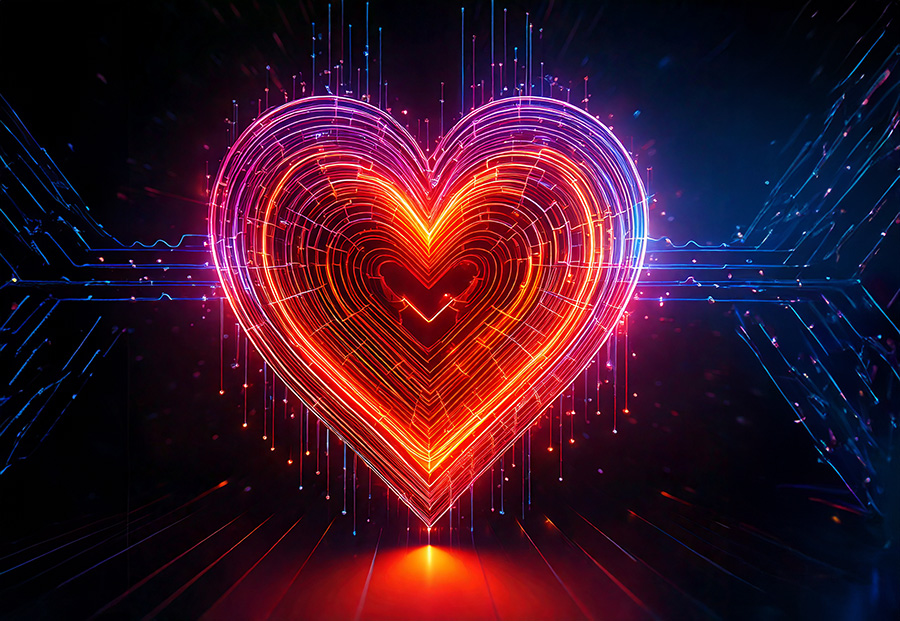In the March issue article “The AI Revolution: How Artificial Intelligence is Reshaping Western Culture”, we gave you a sneak peek into the many ways AI is changing our world—from work to creativity to mental health. This month, we’re diving into one area that’s really close to home: love. How are AI and dating apps reshaping how we find relationships? With matchmaking algorithms, AI-powered icebreakers, and even virtual dating assistants, technology is automating dating—but is it helping us build genuine connections? Let’s take a closer look at the role AI is playing in modern romance.
At the turn of the second millennium, online dating was still a little weird.
Sure, Match.com had been around for a few years, but telling someone you were looking for love on the internet was still met with raised eyebrows. Back then, online dating was something you did quietly—before it became mainstream, before dating apps took over our social lives.
But I was a young professional with clear goals. I wanted a serious relationship, and my options in the real world were limited. I worked in tech, so I wasn’t put off by the idea of using an algorithm to help me find a partner. My future husband—also a tech guy—felt the same way. We matched, exchanged emails, talked on the phone, met in person, and the rest is history.
Fast forward to today, and online dating is not only normal—it’s practically expected. But something has changed.
The algorithms that once served as simple matchmakers have evolved. Now, artificial intelligence (AI) is analyzing everything from our swiping habits to our text conversations. It’s predicting compatibility, generating icebreakers, and even coaching us on how to improve our relationships.
Which begs the question: Is AI making dating better, or are we losing something in the process?
Let’s take a closer look.
AI as a Matchmaker: Smarter, Faster… but Wiser?
When I signed up for Match.com, the system worked like an old-school classified ad with a bit of search filtering. You entered what you wanted, browsed profiles, and made decisions based on gut instinct. Today’s AI-driven dating apps make that look primitive.
Modern apps use AI to go far beyond basic profile matching. They analyze:
- User behavior – Who you swipe on, how long you linger on a profile, and how you engage in conversations.
- Facial recognition – Apps like Iris Dating assess physical preferences and suggest matches accordingly.
- Predictive analytics – AI anticipates your future preferences, sometimes before you even recognize them yourself.
On the surface, this is helpful. AI can streamline the process, cutting through thousands of profiles to find a match you’re more likely to connect with. But can a machine truly understand chemistry? Attraction is often unpredictable, sparked by body language, shared laughter, or an unexpected conversation.
That’s something no algorithm can quantify.
AI’s Role in Relationships: Tool or Substitute?
AI isn’t just helping people find dates—it’s trying to “help” relationships last.
Some AI-powered tools analyze communication patterns between couples, detecting signs of stress or conflict. They can track the emotional tone of messages and even suggest ways to phrase things more constructively.
But let’s be clear: AI is a tool. It does not take the place of a therapist.
A human counselor has intuition, empathy, and emotional intelligence—things no algorithm can replicate. A good therapist can read body language, hear the emotion behind words, and understand complex human dynamics in a way AI simply cannot. In addition to that, there is something reassuring about talking to another flawed human who truly understands what we are going through.
However, an AI-powered tool in the hands of a skilled therapist? That’s a different story. AI could help identify destructive patterns or surface issues that a couple may not recognize on their own. The key is that AI should support human judgment, not replace it.
When it comes to relationships, nuance matters. AI may recognize a pattern, but only a human can understand the why behind it.
AI-Generated Conversations: Connection or Illusion?
One of AI’s more controversial roles in dating is its ability to craft messages for users.
Take “Rizz,” an AI-powered dating assistant that helps people write flirty openers and even respond to messages. In theory, this removes the pressure of coming up with the perfect first line.
But what happens when two people using AI-generated responses match? Is it really them connecting, or just their chatbots flirting with each other?
Dating has always involved a bit of awkwardness. It’s part of the process—figuring out how to make conversation, learning what makes someone laugh, stumbling through first-date jitters. If AI smooths all of that over, are we making dating easier, or just making it less real?
Authenticity matters. AI should assist, not replace, genuine human effort.
The Safety Factor: AI as a Guardian Angel?
One area where AI is making dating better is security.
AI-driven fraud detection helps eliminate fake profiles by analyzing language patterns, detecting inconsistencies, and flagging scammers before they can do harm. Some apps now require AI-powered identity verification, where users must submit a live selfie to confirm they match their profile pictures.
Additionally, AI is being used to monitor for harassment. Apps like Tinder have implemented tools that detect inappropriate messages and warn users before they hit “send.”
While AI can’t prevent bad behavior, it’s certainly making dating apps a safer place.
The Future of AI and Dating: What’s Next?
Looking ahead, AI in dating will likely become even more advanced. Some companies are experimenting with AI-generated virtual partners—digital companions designed to mimic human interaction.
Even more concerning, AI dating agents may soon be able to swipe, message, and schedule dates on your behalf. While this might sound efficient, it raises a big question:
At what point are we outsourcing too much?
Dating is about human connection. It’s about discovering someone’s quirks, experiencing the unpredictability of relationships, and choosing to invest in another person. AI can make that process easier, but it should not remove the effort altogether.
If finding love becomes as automated as ordering food online, we risk losing the very thing that makes relationships meaningful: the work we put into them.
Final Thoughts: AI Can Help You Find Love—But It Can’t Be Love
AI is changing the dating landscape in profound ways. It’s making matchmaking more efficient, improving safety, and even helping couples communicate better. But it has limitations.
AI is a tool, not a substitute for human intuition, emotional intelligence, and genuine connection.
For those of us who remember early online dating—the days of crafting our own messages, relying on instinct, and embracing the unpredictability of meeting someone new—the rise of AI in dating is both exciting and a little unsettling.
At the end of the day, AI may help you find love, but it can’t be love. That part? That’s still up to us.


